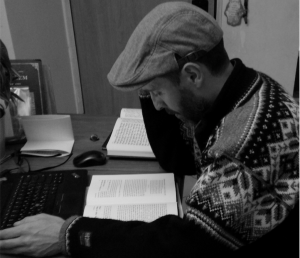Redemption Narratives and the Other
Jewish holidays do not take place in an historical vacuum, ever – Pesach, together with Purim, is one of the more problematic holidays, at least so I think it is for those people who, to quote Milton, do wish to “be govern’d by reason, and not generally give up thir understanding to a double tyrannie, of Custom from without, and blind affections within.” Pesach is a story of redemption, delineating the trajectory from a hic et nunc of slavery and misery, to an illic et tunc of freedom – the readers, or better those who participate in the ritual meal of the Seder, are called to locate themselves on this trajectory, to fashion themselves into veritable participants in the narrative even though they will also always already be extraneous to it. The story we are called to see is, to put it in a univocal and very digestible way, how the People of Israel were freed from the chains of slavery by the direct intervention of God, and led through a process of cleansing / purification as they passed through the open waters of the Red Sea.
But is it really that simple? The Haggada invites us over and over again to both perform and question this process of identification. We are both part of it and not, both walking out of slavery while still solidly based in a state of cultural and spiritual bondage. We hold the plate with the matzot and state to all those who are present that “This is the bread of affliction that our fathers ate in the land of Egypt” – with a typical example of performative utterance the matza is turned into the actual bread of affliction eaten by the Jews in Egypt. And while we are still called to remember that there are always “Others” who are poor and who have nothing to eat and who are nevertheless to be included in this process of ahistorical identification, the Haggada makes a clear-cut distinction between the “here and now” of slavery and the “there and then” of redemption. We are part of it, and we are not – we are in and we are out.
In fact, all nights really are the same – so why should this one be special? The answer is: we are the ones who turn it into something unique. We are the ones who, entrenched in our present state of bondage, can turn those very chains into the words of a story. We are all the sons – the wise son, the wicked son, the simpleton and the one who does not know how to ask. This narrative delineates a clear trajectory from the bondage of an intellectual incapacity to distinguish between a state of slavery and a state of freedom, between who we are and who our fathers were, all the way to a clear and immediate consciousness of the presence of God in the present, of Divine intervention in every stage of the national history.
And yet: as the texts lead the reader through the different stages of this process, I cannot but think that slavery is not something one can break out of. By this I mean that whatever happens to the people of Israel, God will always remind them of that specific state of bondage, he will order them not to discriminate the “ger” or the “stranger” specifically because they themselves lived that state of cultural estrangement in Egypt. It is not merely that “you can take the Jew out of Egypt but you can’t take Egypt out of the Jew” – it’s more a question of awareness, wherein the Jew is historically led through a series of events (within texts and narratives) in order to refine his cultural identity, which does not mean, as the Israeli Minister of Education MK Naftali Bennett stated a few months ago, that “the other is not me – I am myself, and he is he.” It means, on the contrary, that identity is a relative concept, it comes as an outcome of the interaction with Egyptians, Babylonians, Assyrians, Persians, etc. Yes, it is important to have the right questions, it is essential to be able to recognize Divine Providence and to be grateful for it (Dayenu!), it is important to be able to identify with forefathers and their search for a Land, for independence, for a home – it is essential to create a bond of continuum between the hic et nunc and the illic et tunc, while also merging the two, in order to keep this unstable dance alive and in perpetual change / motion. But it is also important to see that there is always slavery and there are always intense, punctiform moments of redemption – there is cultural independence but there is also always an Other that calls us, forces us to break the limits of our identity, and to re-form it as a function of that encounter. As reality changes, our stories empower us to fashion it into the shapes we will – but as we do this, as we eat the bread of affliction and we discuss the forms of redemption until dawn, it is of the utmost importance that we remember that Egypt made Israel into a collective of perpetual strangers:
“(33) And if a stranger sojourn with thee in your land, ye shall not vex him. (34) But the stranger that dwelleth with you shall be unto you as one born among you, and thou shalt love him as thyself; for ye were strangers in the land of Egypt: I am the LORD your God.”
— Leviticus 19:33-34.
*Yaakov Mascetti holds a Ph.D. and teaches at the Department of Comparative Literature, Bar Ilan University.

